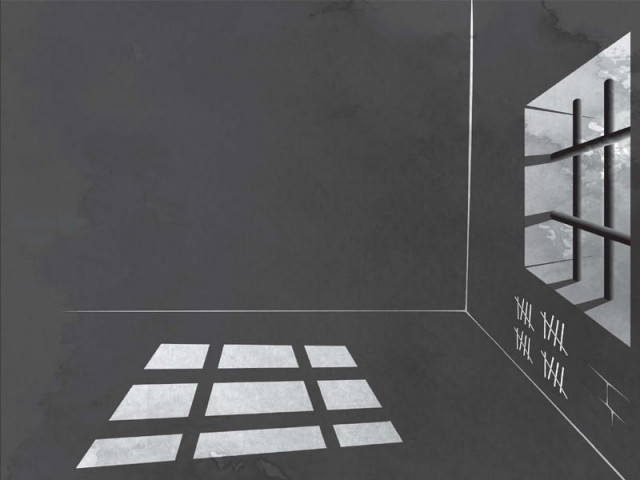Just and unjust: A prisoner’s thesis
Abrar Shah struggles to reform the prison he remains an inmate of.

Behind bars at the Sahiwal Central Jail, 40-year-old Abrar Shah echoes the words of Habib Jalib, a poet imprisoned during Ayub Khan’s regime in the 60s. A master’s degree holder in Political Science from Punjab University, Shah has been in prison since 2004 in a kidnapping for ransom case that he alleges was framed. He was given a life sentence, the maximum punishment to serve 25 years under the offence he has been convicted of.
“I am currently writing a thesis on prison reforms highlighting a weak judiciary and poor prosecution in Pakistan,” Shah says.
The prisoner has recorded first-hand accounts of hundreds of his fellow inmates interviewed by him over the last seven years, compiling a detailed document that he hopes to publish as a book soon. His thesis focuses on case studies of victims of the judicial system and puts forward recommendations for policy makers.
Shah also highlights that prisons are ‘universities’ for ‘learning’ crime, where innocent prisoners are transformed into hardened criminals by the time of release. “The judges forgo their responsibility by handing out maximum punishments for offences even though verdicts usually mention poor prosecution. Many laws are misused and people are wrongly convicted,” he adds. Shah elaborates upon discrimination in prison rules, stating that he is not entitled to any remissions, while other life-imprisonment convicts are rewarded through appeals and get out in 10-12 years.
(Read: Prison and reform - ‘We need to teach and pacify them while they are in jail’)
Shah says he spent his first year in jail in despair. But a friend in jail counseled him, advising him to read. He began to study and now maintains a prison library consisting of almost 100 books, including the complete collection of poet Faiz Ahmed Faiz who wrote many of his works while in the very same Sahiwal Jail as a political prisoner.
As a result of his scholarly habits, the jail administration has appointed him as the informal legal counsel for prisoners who want to pursue their cases in higher courts but don’t have access to a lawyer. He writes review petitions for inmates for free. Shah says his education helped him earn a good name amongst the jail staff, but not everyone is so lucky. “Within the walls of prison, the world has a different set of rules and we all have to follow them without questioning them.” He says this cautiously, looking around to see if anyone is listening to him speak. “Most prisoners who are on death row and even on life imprisonment here lose their sanity in a few years. Just last month, a prisoner committed suicide after he was sexually tortured by the prison staff.” Shah alleges that many prisoners are routinely tortured.
His claims appear to be substantiated by a Human Rights Commission of Pakistan (HRCP) 2010 report.
Shah, whose review petition has been pending for over a year now at the Supreme Court of Pakistan, reiterates that he is a victim of the judicial system too. With another 18 years of captivity looming before him, Shah says he will continue to help new inmates.
Before parting, the weary prisoner asks if his conversations reflected pessimism. “I try to be optimistic. After all, hope is all what I am left with,” Shah says with a smile.
Published in The Express Tribune, September 3rd, 2011.


1724319076-0/Untitled-design-(5)1724319076-0-208x130.webp)
















COMMENTS
Comments are moderated and generally will be posted if they are on-topic and not abusive.
For more information, please see our Comments FAQ